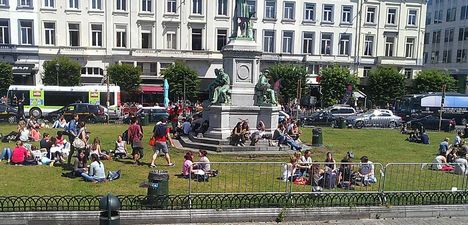Susannah Savage, Columnist @Swizz677
We don’t get free tea and coffee in the Commission, tax payers will be delighted to know.
Thus the queue for the coffee machines, where thoroughly unappetising coffee is only 30 cent, is normally very long.
Recently when bracing myself to pretend the shot size café au lait I was purchasing was equal to if not better than the pint of heavenly caramel latte I could have in London I had the misfortune to drop my 20 cent piece.
I watch it roll underneath the machine and, ignoring the disgruntled expressions of five or six sleep-deprived eurocrats, and the apparent embarrassment of my friends, I get down on the floor and begin an undignified retrieval mission.
A while later, clutching my 20 cent, a clump of hair and what was potentially once chewing gum, I jump up and turn to the now considerably longer queue behind me to share my elation. Greeted by much tutting, sighing and foot tapping (the bureaucratic equivalent of an angry mob rioting with pitch forks) I feel the need to explain myself:
“If trainees were better paid I wouldn’t need to crawl around on the floor for 20 cent!” I announce confidently, hoping to remind them of the vast difference between our salaries, and shame them into submission.
A few eyebrows twitch, but most retain a robotic fixation on the coffee machine.
The lack of response to my outburst was probably justified. If interns were dung beetles – which, in terms of hierarchy, seems a fitting analogy – trainees in the EU institutions are the ones that found the largest pile of excrement.
We are paid (remunerated technically) enough to survive, usually respected by our colleagues and generally able to learn skills that don’t include tea or coffee making; whether the latter is because of the Commission’s lack of tea/ coffee making facilities I can’t be sure, but I have never photocopied or shredded anything either.
Brussels is a mecca for interns, not all of whom are as fortunate as us. They swarm here from all over Europe to proffer their time, services (and souls if necessary) to some NGO, consultancy or lobby group. They are ‘getting their foot on the career ladder’; which for many in reality amounts to draining their parents’ bank account in order to spend their days stapling things and their nights stalking MEPs.
Particularly on a Thursday night the interns of Brussels all gather at Place de Luxembourg or ‘Plux’ for what starts as an all-out offensive to woo an MEP and get an actual job but normally descends into swigging from a €3 bottle of wine and exchanging saliva with the nearest vaguely attractive fellow intern or a lecherous MEP’s assistant.
Such behaviour was, depending on personal standards, fine when we were grotty teenagers with youthful livers and dreams of becoming popstars or astronauts, but for some of Brussel’s interns the days of pocket money should be long gone.
My flatmate, for example, is thirty-two. He is an unpaid intern at an NGO, on internship number four or five and although I’ve never actually seen him swig €3 wine, he still receives regular food parcels from his mother. He, and a lot of other interns like him, are not on a mere stepping stone between university and a real job or taking a short and necessary pit stop on the path to employment; they’re involuntary lost boys and girls trapped in Neverland.
They may be dodging unemployment (and unemployment statistics), making contacts, building their CVs and (if lucky) gaining valuable experience, but not even Peter Pan could live off fairy dust for as long as young or ‘young’ people are expected to these days. I also feel that Peter too would eventually tire of so frequently finding himself exploited by a bunch of pirates.


